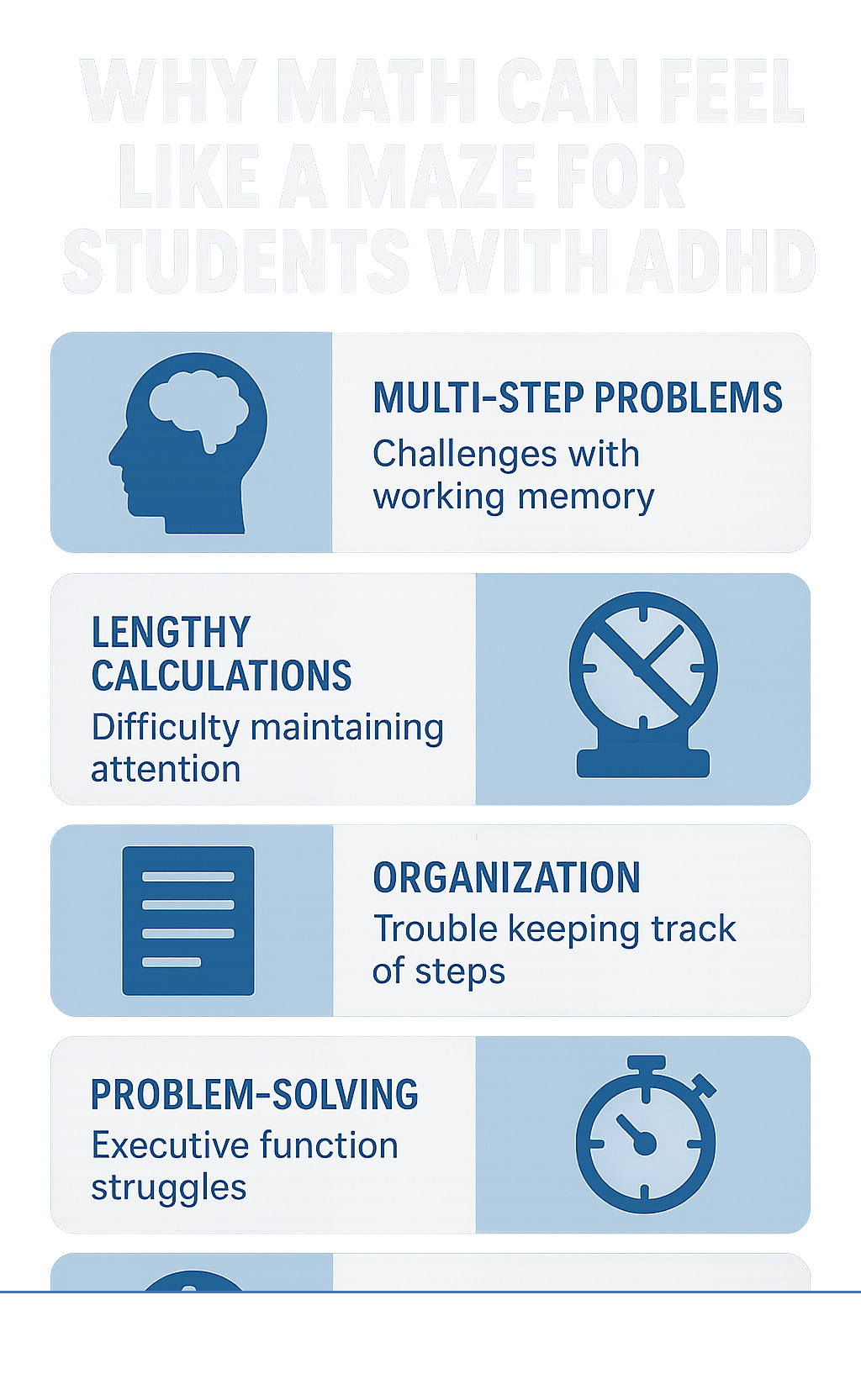
Why Math Can Feel Like a Maze for Students with ADHD
For a student with Attention-Deficit/Hyperactivity Disorder (ADHD), a math worksheet can feel less like a set of problems and more like an intricate, frustrating maze. Every multi-step equation is a new corridor with countless turns, each calculation a potential dead end. They might understand the destination—the correct answer—but navigating the path requires a set of mental tools that ADHD can make difficult to access. Finding the right adhd math tutor is about providing a guide who not only knows the layout of the maze but can also equip your child with a personalized map and compass to steer it successfully.
This struggle is far more common than many realize. According to the CDC, approximately 6 million school-aged children in the U.S. have an ADHD diagnosis. For a significant number of them, mathematics presents a unique and persistent hurdle. The subject’s heavy reliance on skills like working memory, sustained attention, and sequential processing creates a perfect storm of challenges. A child with ADHD may grasp a new concept in class but then lose track during a multi-step problem, forget the proper order of operations (PEMDAS), or make seemingly careless mistakes that are actually symptoms of an overloaded cognitive system.
Key Strategies for ADHD Math Success:
- Chunking information into smaller, more manageable pieces to prevent cognitive overload.
- Multi-sensory learning that engages sight, sound, and touch using manipulatives, diagrams, and interactive digital tools.
- Frequent, structured breaks to help the brain reset, maintain focus, and prevent mental fatigue and overwhelm.
- Individualized pacing that honors the child’s unique processing speed, rather than forcing them into a one-size-fits-all timeline.
- Explicit executive function support to build skills in organization, planning, time management, and self-monitoring.
- Consistent positive reinforcement to build confidence, foster a growth mindset, and repair a student’s relationship with math.
It is crucial to understand that these difficulties are not about intelligence. A student’s challenges with math are not a reflection of their potential or their ability to think critically. In fact, students with ADHD often possess remarkable creativity, out-of-the-box thinking, and unique problem-solving skills. The disconnect happens when traditional teaching methods don’t align with their neurodiverse brain wiring. The goal isn’t to force them to learn like everyone else; it’s to find teaching methods that work with, not against, their natural cognitive style.
I’m Peter Panopoulos, founder of A Traveling Teacher. After teaching middle school math in Massachusetts for over eight years, I witnessed how standardized instruction could leave bright, capable students with ADHD feeling defeated. I saw how specialized strategies, custom to the individual, could open up their hidden potential and transform their entire academic outlook. At A Traveling Teacher, our team of licensed educators is dedicated to using these research-backed, personalized methods to help students with ADHD build not just math skills, but lasting confidence, all through convenient online sessions.

The ADHD Brain and Math: Understanding the Connection
When a child with ADHD sits down to tackle a math problem, their brain is working overtime, managing not just the numbers but also the complex internal processes of focus, memory, and regulation. ADHD is a neurodevelopmental condition that primarily affects the brain’s executive functions—the set of mental skills that act as the brain’s management system. These functions include attention, impulse control, working memory, and organization. Because mathematics is one of the most executive-function-intensive subjects in school, it often becomes a major point of friction for these students.
Think of executive functions as the CEO of the brain. For a math problem, the CEO needs to:
- Use working memory to hold numbers and steps in mind while performing another operation (e.g., remembering the ‘carried’ number in addition).
- Maintain sustained attention to track details like decimal points and negative signs through a long calculation.
- Manage time and pace effectively to complete a set of problems or a test within the allotted period.
- Organize steps in a logical sequence, such as following the order of operations in an algebraic expression.
For a student with ADHD, this internal CEO might be brilliant and creative but also easily distracted or overwhelmed. The result is a bright student who understands the core concept but consistently loses their place in long division, forgets a crucial step in solving for x, or makes what teachers call “careless mistakes.” These errors are rarely due to carelessness; they are symptoms of a brain struggling to manage multiple cognitive demands simultaneously. This is why it’s crucial to remember: it’s not about intelligence; it’s about how their brain is wired to process information.
This persistent struggle often gives rise to a secondary, equally challenging issue: math anxiety. When every math class or homework session is a source of frustration, the brain begins to associate math with stress. This emotional response can worsen ADHD symptoms, creating a vicious cycle where anxiety interferes with focus, and a lack of focus leads to more errors, which in turn fuels more anxiety. Furthermore, differences in processing speed can make timed tests feel like an impossible race, and the abstract concepts in higher-level math, like algebra and geometry, can be particularly difficult when working memory is already taxed.
How ADHD Specifically Impacts Math Skills
Here’s a more detailed look at how these challenges can manifest in your child’s math work:
- Multi-step problems: In tasks like solving a complex word problem or a multi-step equation, the student might correctly perform the first two steps but then forget the third or lose track of the overall goal. Impulsivity might cause them to jump to a conclusion without completing all the necessary calculations.
- Basic fact recall: Many students with ADHD have difficulty with rote memorization. This means that recalling basic multiplication tables or division facts doesn’t become automatic. Consequently, every time they encounter a multi-digit multiplication problem, they have to expend extra mental energy on the basic facts, leaving less cognitive bandwidth for the more complex steps.
- Word problems: Translating language into mathematical operations is a sophisticated executive function task. A student needs to identify relevant information, ignore irrelevant details, determine the correct operation, and structure the problem. This is a common area of difficulty.
- Careless errors: Rushing, poor handwriting, or misaligning numbers in columns can lead to incorrect answers, even when the student knows the procedure. This is often a result of impulsivity and challenges with fine motor control or visual-spatial organization.
- Overwhelm and Avoidance: A long page of problems can look like an impossible mountain. This feeling of being overwhelmed can lead to frustration, emotional meltdowns, or task avoidance, where the student simply shuts down and refuses to try.
It’s Not a Lack of Intelligence, It’s a Difference in Brain Wiring
It cannot be overstated: these math challenges do not reflect your child’s intelligence. They are direct indicators of a difference in brain wiring. In fact, students with ADHD often bring incredible strengths to the table that can be assets in mathematics. Their creative thinking can lead to innovative problem-solving approaches that others might not see. Their ability to hyperfocus on topics that genuinely engage them can result in deep, passionate learning. The key is to create a learning environment that leverages these strengths.
At A Traveling Teacher, we champion a strengths-based approach that transforms the learning process. We work with your child’s natural abilities, not against their challenges. A student who is bored by worksheets might excel when math is connected to their interest in coding, art, or sports. A student who struggles to remember formulas might thrive when they use hands-on tools to find the concepts for themselves.
Building confidence is just as important as teaching math concepts. We view ADHD as a form of neurodiversity that requires customized, empathetic support. Finding the right adhd math tutor in Massachusetts or anywhere online—one who truly understands this perspective—can be the catalyst that open ups your child’s full potential. The goal isn’t to ‘fix’ ADHD, but to provide the strategies and tools that empower them to succeed with their unique, creative, and capable brain. When students feel understood and supported, they gain the confidence to tackle challenges that once seemed impossible.
How a Specialized ADHD Math Tutor Transforms Learning
How is specialized ADHD math tutoring fundamentally different from the regular tutoring many parents are familiar with? The distinction is critical. Traditional tutoring methods often operate on the assumption that the student has a content gap; they simply need the material explained again or need help completing homework. While well-intentioned, this approach can lead to even more frustration for a student with ADHD, because the problem is rarely just about the content.
For students with ADHD, content mastery is the result, not the starting point. Our adhd math tutor approach at A Traveling Teacher is built on a foundation of student engagement, executive function coaching, and active confidence-building. We don’t just present information; we create a dynamic, adaptable learning environment. Sessions are intentionally designed with planned breaks, and material is “chunked” into digestible segments to prevent cognitive overload. We teach essential math skills alongside crucial life skills like organization, time management, emotional regulation, and self-advocacy. This holistic method is powerful because no two students with ADHD are alike. We teach to the individual, changing learning from a source of struggle into an experience of genuine understanding and empowerment.
| Feature | Traditional Tutoring | ADHD Math Tutoring (Our Approach) |
|---|---|---|
| Primary Focus | Content mastery, homework completion | Student engagement, executive function skills, confidence-building |
| Approach to Learning | One-size-fits-all explanations, repetition | Individualized, multi-sensory, strengths-based, flexible pacing |
| Structure of Sessions | Often rigid, fixed duration per topic | Dynamic, adaptable, incorporates breaks, “chunking” of material |
| Skill Development | Subject-specific knowledge | Math skills plus organization, time management, self-advocacy, focus |
| Motivation & Engagement | Relies on student’s inherent motivation | Actively builds rapport, uses engaging techniques, celebrates small wins |
| Addressing Anxiety | May not explicitly address underlying anxiety | Integrates strategies for coping with stress and building resilience |
| Pacing | Teacher-led, follows a set curriculum | Student-centered, adjusts to the student’s processing speed and needs |
| Parent Communication | Typically focused on academic progress | Collaborative partnership including strategies for home support |

Key Strategies to Keep Students Engaged and Focused
Engagement is the gateway to learning for a student with ADHD. If they aren’t engaged, the brain’s ‘gatekeeper’ for new information remains closed. Our tutors are trained in research-backed strategies designed to keep students focused, motivated, and excited about math.
- Chunking Information: Instead of presenting a worksheet with 20 problems, a tutor will break it down into four sets of five. Completing each small set provides a sense of accomplishment and a moment to reset. This technique directly combats the feeling of overwhelm by making large tasks feel manageable and providing frequent ‘finish lines.’
- Multi-sensory Learning: This approach reinforces concepts by engaging multiple neural pathways. A tutor might use a digital whiteboard for visual explanations, have the student use virtual manipulatives to ‘feel’ the problem, and encourage them to talk through the steps aloud (auditory). We often use frameworks like the Concrete-Representational-Abstract (CRA) Method, where students first handle physical or digital objects, then draw representations, and finally move to abstract numbers and symbols. Color-coding notes and using visual reminders are also key components.
- Regular Movement Breaks: For many students with ADHD, sitting still is a challenge that consumes valuable mental energy. We incorporate short, planned breaks for stretching, jumping jacks, or even just a quick walk around the room. These breaks aren’t a reward; they are a neurological necessity that helps the brain reset, improving focus and retention when the student returns to the task.
- Gamification and Personal Interests: We make learning fun by turning practice into a game. This could involve using a point system, racing against the clock (in a low-stakes way), or using online educational games. More importantly, we relate math to student interests. If a child loves Minecraft, we can use it to teach geometry and volume. If they’re passionate about sports, we can analyze player statistics. This relevance boosts engagement and can trigger a state of hyper-focus, where the student becomes deeply absorbed in their learning.
- Positive Reinforcement and Frequent Feedback: We focus on progress, not perfection. Instead of only praising the correct answer, we celebrate the effort, the use of a new strategy, or the persistence shown on a tough problem. This helps build a growth mindset and repairs the math-related anxiety many students carry. Small wins matter, and acknowledging them builds momentum and motivation.
For additional insights, we often refer families to these helpful strategies for teachers and tutors from ADDitude Magazine, which align with our philosophy.
What to Look for in a Qualified ADHD Math Tutor
Choosing the right ADHD math tutor is about more than finding someone who is good at math; it’s about finding an educator who understands the ADHD brain.
Look for tutors with specific experience with ADHD or backgrounds in special education. They will have the training and knowledge to anticipate challenges and implement effective strategies. Patience and empathy are non-negotiable. A great tutor remains calm and encouraging, even when a student is frustrated or dysregulated. They prioritize relationship-building, knowing that a student who trusts their tutor is more willing to take risks and be vulnerable in their learning. They must also have strong communication skills to create a collaborative team with you, your child, and their classroom teachers.
A qualified tutor possesses a deep knowledge of various teaching methods. They don’t have just one way of explaining a concept; they have a toolbox of multi-sensory approaches, executive function coaching techniques, and engagement strategies, and they know how to tailor them to your child’s specific needs. Most importantly, they must have the ability to build genuine rapport. A student who feels seen, understood, and respected is a student who is ready to learn.
We invite you to consider working with an experienced online tutor from our team. We handpick our educators for these exact qualities, focusing on confidence-building to ensure every student feels capable and supported.
How Specialized Tutoring is Different from a Standard Approach
A specialized adhd math tutor provides a holistic approach that extends far beyond nightly homework help. The goal is to empower students for long-term, independent success. Our primary objective is teaching lifelong study skills and executive function strategies. We don’t just give answers; we equip students with tools like checklists, graphic organizers, and self-monitoring techniques so they can plan their work and find solutions independently, which systematically reduces overwhelm.
We also explicitly address underlying math anxiety. This is often deeply intertwined with ADHD, and we integrate coping strategies, mindfulness techniques, and positive self-talk into our sessions to help students foster a healthier, more positive relationship with learning. We customize the pace and style of every single session to match your child’s energy and focus levels on any given day. Finally, we help them build crucial self-advocacy skills, teaching them how to ask for help, explain what they need, and communicate effectively with their teachers. This promotes a sense of agency and independence that will serve them throughout their entire academic career and beyond.
We encourage you to explore our tutoring subjects to see the full breadth of the holistic support we offer. When we support the whole student—the academic, the emotional, and the strategic thinker—that’s when real, lasting change happens.
The Tangible Benefits: From Better Grades to Renewed Confidence
Parents often come to us seeking an ADHD math tutor with a primary goal in mind: improving their child’s grades. While academic improvement is a consistent and important outcome, the real magic we witness is the profound change in a child’s attitude. We see students shift from anxiety and frustration to a state of genuine confidence and curiosity. This change in self-perception is the most powerful benefit, creating a positive ripple effect that extends far beyond the math classroom.
The benefits of specialized, one-on-one ADHD math tutoring are multi-faceted:
- Improved Academic Performance: This is often the most visible result. We’ve seen students make remarkable gains, like one middle schooler who went from a struggling 46% to an impressive 88% in a single semester. Better grades are a direct result of deeper conceptual understanding, improved focus, and fewer ‘careless’ errors. This success often spills over into other subjects, particularly sciences that rely on mathematical skills.
- Increased Self-Esteem and Confidence: Success in a subject that was once a source of failure is incredibly empowering. When a child realizes they can do hard things, it fundamentally changes their self-concept. They start to see themselves as capable learners, which boosts their willingness to participate in class, ask questions, and tackle new challenges.
- Reduced Homework Battles and Family Stress: For many families, homework is a nightly source of conflict and tears. By equipping students with strategies to manage their work and providing a dedicated time for focused support, tutoring can bring peace back to the household. Homework becomes a manageable task rather than a nightly struggle for the whole family.
- Improved Organizational and Executive Function Skills: Students don’t just learn the Pythagorean theorem; they learn how to learn. They develop practical skills in note-taking, using a planner, breaking down large assignments, and organizing their materials. These executive function skills are transferable to all subjects and are essential for success in high school, college, and beyond.
- A Positive Attitude Toward Learning: Perhaps the most important benefit is the rekindling of a child’s natural curiosity. As frustration and anxiety decrease, they become more engaged, motivated, and open to the learning process. Math is no longer something to be feared, but a challenge to be met.

Measuring Success and Tracking Progress
How do we know it’s working? We track progress comprehensively, looking beyond just the grade on a report card. Success is a combination of quantitative data and qualitative observations. Together with parents, we establish clear, achievable goals at the outset. Progress is then tracked through:
- Session Notes and Tutor Feedback: Our tutors provide detailed notes after each session, highlighting concepts covered, strategies used, areas of success, and ongoing challenges.
- Qualitative Changes: We look for changes in behavior and attitude. Is the student starting their homework more independently? Are they less anxious before a test? Are they participating more in tutoring sessions? These are powerful indicators of progress.
- Academic Metrics: We, of course, monitor homework completion rates, quiz results, and test scores. Seeing these numbers climb is a concrete validation of the student’s hard work.
- Student Self-Reflection: We encourage students to recognize their own growth. Asking questions like, “What was a strategy that worked well for you today?” or “Do you remember when this type of problem used to be really hard?” helps them build metacognition and internalize their successes, fostering intrinsic motivation.
The Parent’s Role: How to Support the Tutoring Journey
As a parent, your partnership is a vital component of your child’s success. The best outcomes occur when parents, students, teachers, and tutors work as a cohesive team. Here’s how you can create a supportive environment at home:
- Create a Consistent Routine: Structure and predictability are calming for the ADHD brain. Establish a consistent time and a quiet, distraction-free space for online tutoring sessions. This helps signal to your child’s brain that it’s time to focus and learn.
- Communicate Openly and Regularly: Maintain an open line of communication with the tutor. Share information from your child’s teacher, let the tutor know about upcoming tests or projects, and provide feedback on how homework is going at home. This collaborative approach allows the tutor to tailor sessions to your child’s immediate needs.
- Reinforce Strategies at Home: Ask the tutor what strategies they are working on and find ways to gently reinforce them. If they are using a checklist for word problems, you can remind your child to use it during homework. This helps generalize the skills from the tutoring session to their independent work.
- Focus on Effort Over Perfection: Praise your child’s hard work, persistence, and willingness to try a difficult problem. This helps cultivate a growth mindset, teaching them that intelligence isn’t fixed and that challenges are opportunities to grow. Avoid focusing only on the grade, as this can increase pressure and anxiety.
- Be a Source of Encouragement: Your belief in your child is incredibly powerful. Celebrate the small wins, remind them of how far they’ve come, and be their biggest cheerleader. A supportive, encouraging home environment is the foundation upon which academic confidence is built.
We have had the privilege of supporting hundreds of families throughout Massachusetts and across the country on this journey. You can read testimonials from families like yours to hear their success stories in their own words.
Frequently Asked Questions about ADHD Math Tutoring
Here are detailed answers to the most common questions we hear from parents who are considering specialized online math tutoring for their child with ADHD.
How often should my child have tutoring sessions?
The ideal frequency of tutoring sessions is highly dependent on your child’s individual needs, current academic standing, and specific goals. For many students, one session per week is sufficient for reinforcing classroom learning, receiving homework support, and staying on track with the curriculum. This cadence works well for students who need help with organization and strategy but have a relatively solid conceptual foundation.
For students who have significant foundational gaps, are struggling with severe math anxiety, or need more intensive support to catch up, two to three sessions per week often provides the consistency needed for steady, meaningful progress. This higher frequency allows for more repetition and reinforcement of new skills, which is crucial for committing information to long-term memory. During a personalized consultation, we can discuss your child’s situation and recommend a schedule that will provide the right level of support without causing burnout.
Are online tutoring sessions effective for students with ADHD?
Yes, absolutely. It’s a common concern for parents to worry about online learning and screen-based distractions. However, we find that for many students with ADHD, one-on-one online tutoring is often the ideal format. It provides a highly controlled, comfortable, and familiar environment, free from the social pressures and sensory overload of a classroom or tutoring center. The direct, one-on-one focus with the tutor minimizes external distractions. The flexibility of online tutoring is also a major benefit; sessions can be scheduled during a child’s peak focus times, and the format naturally allows for the movement breaks and flexibility that are so critical for students with ADHD.
What tools and technologies are used in an online adhd math tutor session?
Our online sessions are designed to be engaging and interactive, leveraging technology to create a multi-sensory learning experience. We go far beyond a simple video call. Key tools include:
- Interactive Digital Whiteboards: These allow the tutor and student to write, draw, and solve problems together in real-time, just as they would side-by-side. This is perfect for modeling problem-solving steps and for collaborative work.
- Digital Manipulatives: For concepts like fractions, geometry, or place value, we use virtual tools like blocks, tiles, and protractors. These help make abstract ideas concrete and tangible for students who are visual or kinesthetic learners.
- Educational Games and Platforms: We incorporate fun, high-quality educational games and apps to make practicing skills like multiplication facts or order of operations engaging rather than tedious.
- Screen Sharing: This feature is invaluable for reviewing a student’s digital work, guiding them through online assignments, or demonstrating how to use a specific tool like a graphing calculator.
- Visual Checklists and Timers: To support executive functions, we use on-screen checklists to break down tasks and visual timers to help with pacing and time management. These tools make the structure of the session explicit and help students stay on track.
How is this different from the support my child gets at school?
School-based support, such as an IEP, a 504 plan, or extra help from a teacher, is essential but serves a different purpose. Classroom teachers, even the most dedicated ones, are managing many students at once. School interventions often focus on accommodations (like extra time on tests) rather than intensive, one-on-one skill-building. Specialized tutoring complements school support by providing what the classroom cannot: undivided attention and a completely individualized curriculum. We can slow down to fill foundational gaps that a teacher doesn’t have time to address, and we can focus deeply on building the underlying executive function skills—the how of learning—that are the root cause of many academic struggles.
My child has severe math anxiety. Can you still help?
Yes. In fact, addressing math anxiety is a core component of our approach. We understand that for many students, the emotional barrier to math is just as significant as the conceptual one. Our tutors are trained to be patient, empathetic, and encouraging. We start by building a strong, trusting relationship where the student feels safe to make mistakes. We intentionally build confidence by starting with problems we know the student can succeed at, and we celebrate effort and progress relentlessly. We integrate coping strategies, such as deep breathing or positive self-talk, to manage feelings of overwhelm. By breaking the cycle of anxiety and failure, we help students rebuild a positive relationship with math.
What qualifications do your tutors have?
Our tutors are more than just subject-matter experts; they are fully experienced educators. Every tutor at A Traveling Teacher is a state-licensed teacher, and many hold advanced degrees and have specialized training or experience in special education, literacy, and working with students with diverse learning needs like ADHD. We select our tutors not only for their academic credentials but also for their patience, empathy, and ability to connect with and motivate students. They are passionate professionals dedicated to helping every child succeed.
Conclusion: Give Your Child the Tools to Conquer Math
Your child’s struggles with math are not a reflection of their intelligence, effort, or potential. More often than not, they are navigating a subject that places immense demands on the very skills their ADHD brain processes differently. They aren’t being lazy or careless when they forget a step in a long division problem; their working memory is simply overloaded. They aren’t defiant when they get frustrated with a complex worksheet; they are overwhelmed by the executive function demands of the task.
The good news is that this is a challenge that can be met with the right strategy and support. Every child can succeed in math when they are taught in a way that aligns with how their brain works. Specialized, evidence-based strategies like chunking information into manageable bites, using multi-sensory learning to engage the whole brain, and explicitly teaching and supporting executive function skills can transform mathematics from an intimidating maze into a clear, navigable path.
Our adhd math tutor approach at A Traveling Teacher is fundamentally about changing your child’s relationship with learning. We have seen countless students move from tears and avoidance over homework to confidently raising their hand and tackling problems they once thought were impossible. Our confidence-focused strategies build a foundation of self-belief that extends far beyond the math classroom. When a student with ADHD masters a subject as challenging for them as math, they begin to believe they can tackle anything.

Our personalized online tutoring brings these expert educators directly into your home, creating a comfortable, one-on-one learning environment free from the distractions of a classroom. With flexible scheduling that works for your family and individualized instruction that meets your child exactly where they are, we empower your child with skills that will last a lifetime.
Imagine your child approaching their math homework with a sense of capability instead of dread. Imagine the nightly homework battles replaced by quiet, productive work. This is the reality we help create for families across Massachusetts and beyond. The journey from math struggles to math success doesn’t have to be traveled alone. With the right guide, your child can develop the math skills, organizational habits, and self-advocacy needed for a successful and confident academic career.
Don’t let math continue to be a source of stress and frustration in your home. Book a free consultation today to find the perfect math tutor for your child and take the first, most important step toward open uping their true mathematical potential.